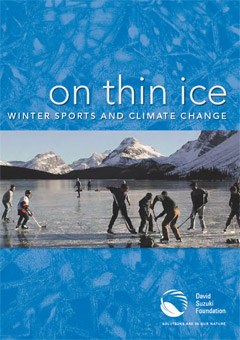On thin ice
| Year of publication | 2009 |
|---|---|
| Publisher(s) | David Suzuki Foundation Website: http://www.davidsuzuki.org |
| Place of publication | Vancouver |
| ISBN/ISSN | 978-1-897375-24-2 |
| Language | en |
| Price | free |
| Purchase | |
| Page(s) | 54 |
| Publication type | Other |
This report examines how the decisions we make now about our response to climate change, including choices to reduce carbon dioxide (fossil fuel-based) emissions and implement adaptive measures, will ultimately affect the future of winter sports and the role they play as part of Canada's identity, natural heritage, and economy. The report concludes with recommendations about how winter sports stakeholders can take action on climate change and begin to adapt to the changes in Canadian winters already underway. Key findings in this report are presented in two global-warming scenarios: a lowerwarming and a high-warming scenario. However, even the lower-warming (lower-emission) scenario is very likely to cause the global average temperature to rise more than 2°C from pre-industrial levels. This 2°C increase in temperature is a threshold that many scientists and governments consider dangerous to crucial ecosystems and the global economy. As a northern country, Canada would likely experience temperature increases several times higher than the global average. There is a silver lining. If Canada were to act with other nations to reduce greenhouse gas emissions to safe levels, keeping the global average temperature below the 2°C threshold, Canada's winter sports and culture could be healthier than predicted even in this report's lower-warming scenario.
